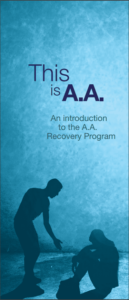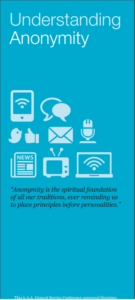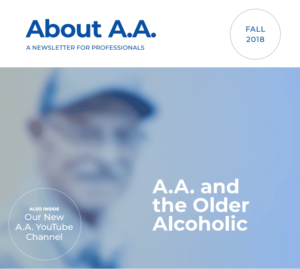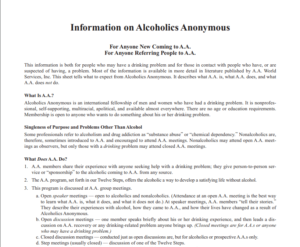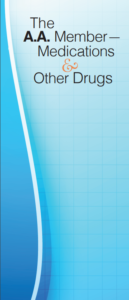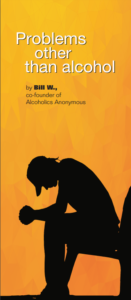A Warm Welcome to our Friends in the Professional Community

Cooperation with the Professional Community
Since the early days of Alcoholics Anonymous cooperation with the professional community has been encouraged. We seek to strengthen and expand our communication with you, and we welcome your comments and suggestions. They help us to work more effectively with you in achieving our common purpose: to help the alcoholic who still suffers.
You might have patients, clients, employees, students, or members of your congregation who may have a drinking problem. You may be part of an organization or group that comes in contact regularly with those suffering from alcoholism. That being the case, it’s likely that we share a common goal: To help the alcoholic man or woman to stop drinking and lead a healthy, productive life.
We’ve Been in Their Shoes
From the depths of despair, many practicing alcoholics come into contact with a variety of professionals. They might be getting a divorce; are having trouble at work; or are dealing with medical or dental issues large and small. They might be in a mess with creditors; are facing legal problems resulting from their drinking and the list goes on. Quite often those with drinking problems are constantly visiting doctors or clergy members looking for answers.
It seldom ever occurs to the practising alcoholic to look up Alcoholics Anonymous in the phone book! Unfortunately he or she may never cross the path of a sober member of A.A. who could help them out, point them in the right direction.
We Want to Help
Many professionals haven’t had the opportunity to find out how the A.A. program of recovery works. More importantly, how the A.A. program can help problem drinkers that they are coming into contact with. That is why we reach out to these professionals, to provide an avenue of support for the many practising alcoholics that may otherwise never find us.
We don’t try to teach the professional. We don’t try to change the way that you do your jobs. We simply want to share our experience, strength and hope with regards to our recovery, so that you are aware of options as you offer help to the men or women that you encounter with an alcohol problem.
An Overview of the A.A. Program
Alcoholics Anonymous is a non-profit, self-supporting, entirely independent fellowship that is not allied with any sect, denomination, politics, organization or institution. Yet A.A. is in a position to serve as a resource to you through its policy of “cooperation but not affiliation” with the professional community. We can serve as a source of personal experience with alcoholism and as an ongoing support system for recovering alcoholics.
How the Program Works
A.A.’s primary purpose, as stated in our Preamble, is: “to stay sober and help other alcoholics to achieve sobriety.” The only requirement for A.A. membership is a desire to stop drinking. There are no dues or fees; we are self-supporting through our own contributions. Members share their experiences in recovery from alcoholism on a one-to-one basis, and introduce the newcomer to A.A.’s Twelve Steps of recovery and its Twelve Traditions that sustain the Fellowship itself.
At the heart of the program are its meetings, which are conducted autonomously by A.A. groups in cities and towns throughout the world. Anyone may attend open meetings of A.A. These usually consist of talks by one or more speakers who share impressions of their past illness and their present recovery in A.A. Some open meetings — to which helping professionals, the media and others are invited — are held for the specific purpose of informing the non-alcoholic (and possibly alcoholic) public about A.A. Additionally there are closed meetings which are only for those individuals that identify themselves as an alcoholic. Alcoholics recovering in A.A. generally attend several meetings each week.
Anonymity
Anonymity helps the Fellowship to govern itself by principles rather than personalities; by attraction rather than promotion. We openly share our program of recovery, but not the names of the individuals in it.
What A.A. Does NOT Do
A.A. does not: Furnish initial motivation for alcoholics to recover; solicit members; engage in or sponsor research; keep attendance records or case histories; join “councils” or social agencies; follow up or try to control its members; make medical or psychological diagnoses or prognoses; provide drying-out or nursing services, hospitalization, drugs, or any medical or psychiatric treatment; offer religious services; engage in education about alcohol; provide housing, food, clothing, jobs, money or any other welfare or social services; provide domestic or vocational counselling; accept any money for its services or any contributions from non-A.A. sources; provide letters of reference to parole boards, lawyers, court officials, social agencies, employers, etc.
There is considerably more information on the program of Alcoholics Anonymous and our desire to cooperate with the professional community. Please feel free to review and download any of the pamphlets listed below at the bottom of this page. Additionally, on the “Contact Us” page of this website is a form that you can direct to the P.I.C.P.C. (Public Information and Cooperation with the Professional Community) committee. Someone will reply to assist you with your inquiry. The information on this page was excerpted from some of the pamphlets listed below. This information and the pamphlets are copyrighted and used with permission of A.A. World Services, Inc. For additional information, please contact the General Service Office at www.aa.org.
• Information on Alcoholics Anonymous
This information is both for people who may have a drinking problem and for those in contact with people who have, or are suspected of having, a problem. This sheet tells what to expect from Alcoholics Anonymous. It describes what A.A. is, what A.A. does, and what A.A. does not do.
© The above graphics are used with permission of A.A. World Services, Inc.
A.A. Copyrighted Literature and other copyrighted A.A. material: This material is used being used on aanorthdakota.org within the limited use policy of AAWS.
• Problems other than Alcohol
Bill’s thoughts on the status of drug addicts within A.A. are as timely as when they appeared in a 1958 Grapevine. P-35
Why Anonymous
This Public Service announcement (P.S.A.) is copyrighted by Alcoholics Anonymous World Services, Inc. (A.A.W.S). All rights reserved.
A.A.W.S. is not affiliated with and does not sponsor this website, its owner, or its content. For more information, please visit www.aa.org.
A.A. Video for Healthcare Professionals
This Public Service announcement (P.S.A.) is copyrighted by Alcoholics Anonymous World Services, Inc. (A.A.W.S). All rights reserved.
A.A.W.S. is not affiliated with and does not sponsor this website, its owner, or its content. For more information, please visit www.aa.org.
A.A. Video for Legal and Corrections Professionals
This Public Service announcement (P.S.A.) is copyrighted by Alcoholics Anonymous World Services, Inc. (A.A.W.S). All rights reserved.
A.A.W.S. is not affiliated with and does not sponsor this website, its owner, or its content. For more information, please visit www.aa.org.
A.A. Video for Employment/Human Resources Professionals
This Public Service announcement (P.S.A.) is copyrighted by Alcoholics Anonymous World Services, Inc. (A.A.W.S). All rights reserved.
A.A.W.S. is not affiliated with and does not sponsor this website, its owner, or its content. For more information, please visit www.aa.org.

